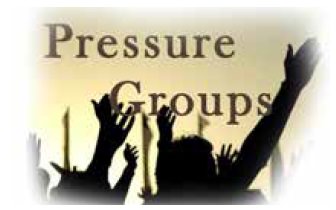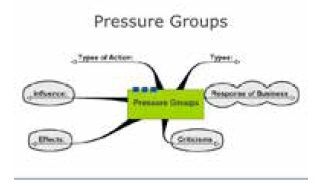Indian Civics - Pressure Groups | 9th Social Science : Civics : Election, Political Parties and Pressure Groups
Chapter: 9th Social Science : Civics : Election, Political Parties and Pressure Groups
Pressure Groups
Pressure Groups
The term ŌĆśpressure groupŌĆÖ originated in the USA. A
pressure group is a group of people who are organised actively for promoting
and defending their common interest. It is so called as it attempts to bring a
change in the public policy by exerting pressure on the government.
The pressure groups are also called ŌĆśinterest
groupsŌĆÖ or vested groups. They are different from the political parties in that
they neither contest elections nor try to capture political power.

1. Pressure Groups in India
A large number of pressure groups exist in India.
But, they are not developed to the same extent as in the USA or the Western
countries like Britain, France, Germany and so on.

The pressure groups in India can be broadly
classified into the following categories:
1. Business
groups
2. Trade
unions
3. Agrarian
groups
4. Professional
associations
5. Student
organisations
6. Religious
organisations
7. Tribal
organisations
8. Linguistic
groups
9. Ideology-based
groups
10.
Environmental protection groups
1.1 Functions of Pressure Groups in India
Pressure groups are the interest groups that work
to secure certain interest by influencing the public policy. They are non
-aligned with any political party and work as an indirect yet powerful group to
influence the policy decisions. Pressure groups carry out a range of functions
including representation, political participation, education, policy
formulation and policy implementation.
Political Participation
Pressure groups can be called the informal face of
politics. They exert influence precisely by mobilising popular support through
activities such as petitions, marches, demonstrations and other forms of
political protest. Such forms of political participation have been particularly
attractive to young people.
1.2 Education
Many pressure groups devote significant resources
by carrying out research, maintaining websites, commenting on government policy
and using high-profile academics, scientists and even celebrities to get their
views across, with an emphasis to cultivate expert authority.
1.3 Policy Formulation
Though the pressure groups themselves are not
policy-makers, yet it does not prevent many of them from participating in the
policy- making process. Many pressure groups are vital sources of information
and render advice to the government and therefore they are regularly consulted
in the process of policy formulation.
Related Topics